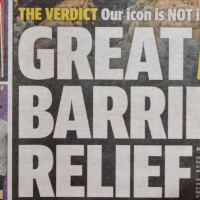 The Lucky CountryWe have it pretty bloody good here, but has it lead to complacency?
The Lucky CountryWe have it pretty bloody good here, but has it lead to complacency?

Stream Wars
With Spotify, Tidal and Apple's Beats on the horizon, the future is as murky as ever RE: online streaming services.
If there’s been anything objectively entertaining about what we can now probably call the “streaming wars”, it would have to be Jay Z and co.’s Tidal launch. A casting call of some of the biggest names in music – Kanye, Alicia Keys, Daft Punk, Chris Taylor, some guy in a leather cowboy hat – stood around looking bored on stage as, one after another, they took turns to spout various jingoisms on how “music is for the people”. Kanye, as usual, looked like he hated everyone and everything. And as good as Daft Punk’s aesthetics are, they look like a couple of awkward virgins at a Star Wars convention when forced to stand still for that long.

It’s clear that Jay Z, who bought Tidal’s parent company Aspiro last year, wanted to make a statement about what Tidal will represent, and how it’s set apart from its competitors. By lining up a bunch of successful artists, he pretty much achieved the double whammy of piquing interest in a potential audience and directly addressed the biggest issue in the streaming industry: the royalties paid to musicians. Still, it is a bit of a shame that, in hindsight, no one really addressed that. Read: Keys’ mostly nonsensical speech:
But as much fun as it is to laugh at the overwrought Illuminati-esque club that’s been built around Tidal, there does appear to be some good things coming out of it. As reported by Digital Music News, Tidal’s royalty payouts for artists are apparently twice as high than those of its main competitor, Spotify. Artists with rights ownership earn around .72 cents per stream on Spotify, while Digital Music News’ leaked document shows that Tidal pays out around 1.2 cents. Except, no, that number might be wrong as well: in a statement just released, Tidal have claimed that the average royalty payout is actually around the 2.4-2.8 cent mark, or around four times higher than Spotify.
So how can they pull it off? Are Hov and Yeez funding the entire thing through the warchest of the Reptilian oil barons they are so obviously a part of? Well, no. It all comes down to the one major difference between Spotify and the rest of the major digital streaming services available, including Tidal: a free subscription service.
Spotify has around 60 million subscribed users as of January this year. That’s a huge number, but only 15 million of those subscribers have a paid premium account. Arguably, the biggest drawcard for Spotify – and one of the biggest reasons it’s become a successful alternative to illegal streaming – is that it offers free streaming with advertisements. As you probably well know, the amount of money artists earn through Spotify has been controversial since the service started, and interviews with execs have led to the general assumption that royalties are not likely to rise any time soon. While it remains the top dog in the streaming game, the growing resentment from artists and pressure from within the industry – from competition and record labels alike – may mean that Spotify is being pushed into a fight it can’t win.
The other big name entering (or re-entering) the streaming game at the moment is Apple’s Beats Music service, the apparent bratty little brother of the whole thing. You probably remember how Dr. Dre sold his ridiculously profitable headphone company to Apple last year for a cool 3 billion dollars, and in true Apple form, Beats seems to be becoming a broad, genericized brand with its finger in every music industry pie. Originally conceived in 2012 as the never-heard-of “Daisy”, Beats looks like it’ll be a wholly separate brand from its parent company. But if you think Apple would simply throw another service out into the ether and hope it works, think again. According to The Verge, Apple have roused the attention of The Department of Justice and the Federal Trade Commission in the US because of their trading practices in relation to Beats – months before the thing is even launched.
According to the report, Apple is putting pressure on major labels to withdraw licensing from any streaming service that offers a free subscription. It’s hard to believe that Apple didn’t think that the vast majority of people wouldn’t instantly assume that it’s an attempt to kill off Spotify as its major competitor, but so far they’ve declined to comment. The report also alleges that Apple offered to pay Universal its full Youtube licensing fee if they removed their videos from the world’s biggest video streaming site. That’s a whole lot of ferreting around behind the scenes, and clearly something that needs to be watched closely. Apple have a long history of being pretty dogmatic when it comes to ownership and licensing, and their entry into the digital streaming industry is worrying at best.
It’s pretty clear that Apple are intending to put a stranglehold on digital streaming, and that means little good news for customers. Spotify have built a broad and loyal consumer base through their accessibility, marketing and by pretty much being the first horse out of the gate, but their platform arguably foregoes the rights of artists for customer satisfaction. Apple seems to be doing the complete opposite. In a strange throwback to the draconian exploits of the record industry 15 to 20 years ago, they look to be using a top-down approach of leverage and power to establish dominance in the market. And Tidal, Jay Z’s passionate pet project, is jammed somewhere in the middle of all of this. It’s had a slow start, but if the royalty statistics are indeed true, Tidal may yet build a more devoted, if limited, consumer base in the coming months. Beats launches later this year, so we’ll have to wait and see how much of an effect it will have on the ongoing evolution of digital music streaming. Either way, it looks like there’s going to be a whole lot of biffo going on.

 The Lucky CountryWe have it pretty bloody good here, but has it lead to complacency?
The Lucky CountryWe have it pretty bloody good here, but has it lead to complacency?
 The Verdict: Murdoch Mass Media Is Not Our FriendA few words for the Brisbane Courier Mail and the supposedly joyous news that the Great Barrier Reef is totally fine.
The Verdict: Murdoch Mass Media Is Not Our FriendA few words for the Brisbane Courier Mail and the supposedly joyous news that the Great Barrier Reef is totally fine.